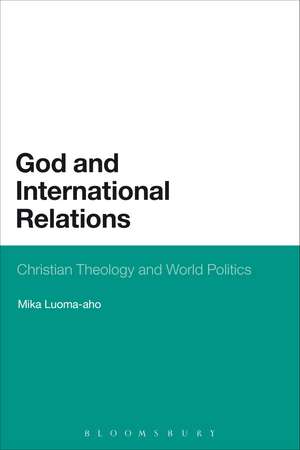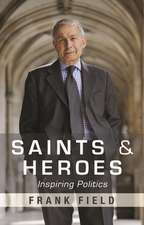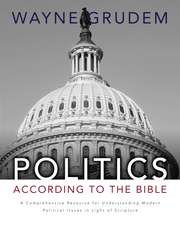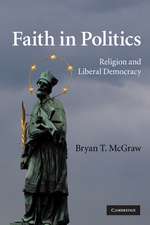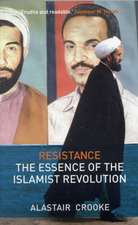God and International Relations: Christian Theology and World Politics
Autor Dr. Mika Luoma-Ahoen Limba Engleză Paperback – 15 ian 2014
| Toate formatele și edițiile | Preț | Express |
|---|---|---|
| Paperback (1) | 255.47 lei 6-8 săpt. | |
| Bloomsbury Publishing – 15 ian 2014 | 255.47 lei 6-8 săpt. | |
| Hardback (1) | 889.08 lei 6-8 săpt. | |
| Bloomsbury Publishing – 30 mai 2012 | 889.08 lei 6-8 săpt. |
Preț: 255.47 lei
Preț vechi: 294.34 lei
-13% Nou
Puncte Express: 383
Preț estimativ în valută:
48.88€ • 51.18$ • 40.55£
48.88€ • 51.18$ • 40.55£
Carte tipărită la comandă
Livrare economică 09-23 aprilie
Preluare comenzi: 021 569.72.76
Specificații
ISBN-13: 9781623561284
ISBN-10: 1623561280
Pagini: 192
Dimensiuni: 152 x 229 x 10 mm
Greutate: 0.26 kg
Editura: Bloomsbury Publishing
Colecția Bloomsbury Academic
Locul publicării:New York, United States
ISBN-10: 1623561280
Pagini: 192
Dimensiuni: 152 x 229 x 10 mm
Greutate: 0.26 kg
Editura: Bloomsbury Publishing
Colecția Bloomsbury Academic
Locul publicării:New York, United States
Caracteristici
Draws from influential Christian thinkers that have not been discussed much in international relations theory.
Notă biografică
Mika Luoma-aho is Head of the Department of Social Studies and a Lecturer in International Relations at the University of Lapland, Finland. He serves on the Editorial Board of Kosmopolis and is the author of four books, including Europe as a Living Organism: Organicist Symbolism and Political Subjectivity in the New Europe (2002).
Cuprins
1 Preface 2 Secularisation of Theological Concepts Symbolism and Beyond The Two Political Worldviews Body Politics-Tradition Jesus Christ as Model Appropriation of Secular Authority Fear and Modern Order3 Sacralisation of International Relations "States are People Too!" Personality, Morality, and Community Anthropomorphism and Religion Political Dogma of IR 4 Political Theology of The United Nations The UN and its Indispensable Foundations Insisting on True Meaning The Tao Development and Guilt5 Conclusion: States and DeathBibliographyIndex
Recenzii
"The gauntlet of God is yet again thrown down against the idolization of the state. A worthy challenge to any IR theorist" -- Iver B. Neumann,Director of Research, Norwegian Institute of International Affairs
"Going beyond Carl Schmitt's argument that "all significant concepts of the modern theory of the state are secularized theological concepts" the author traces the process by which sovereign states became the latest embodiment of the Christian corpus mysticism and a centerpiece of the academic discipline of International Relations. In this major contribution to the emerging political theology of International Relations, the author sheds light on the profound worldwide moral crisis and explains why the discipline is paralyzed when handling some of today's key issues." -Dr. Vendulka Kubálková, Professor of International Studies, University of Miami, Florida
In this fresh and provocative study, Mika Luoma-aho is not content with merely contributing to skepticism concerning the secular narrative about the Westphalian order or with reconfiguring the dilemmas concerning the scientific versus political character of international relations...This book goes beyond the simple acknowledgment of the relevance of religion for the discipline of international relations, and aims at unveiling the religious nature of international relations itself...This deeply theologised rethinking of international relations is intellectually refreshing and exciting, and in a way is much more realistic than the mainstream program of social and political science backed by an alleged 'methodological atheism'.
This is an iconoclastic book. The need for this radical thinking is great when the dangers of extreme nationalism and state isolationism are threatening global solidarity.
"Going beyond Carl Schmitt's argument that "all significant concepts of the modern theory of the state are secularized theological concepts" the author traces the process by which sovereign states became the latest embodiment of the Christian corpus mysticism and a centerpiece of the academic discipline of International Relations. In this major contribution to the emerging political theology of International Relations, the author sheds light on the profound worldwide moral crisis and explains why the discipline is paralyzed when handling some of today's key issues." -Dr. Vendulka Kubálková, Professor of International Studies, University of Miami, Florida
In this fresh and provocative study, Mika Luoma-aho is not content with merely contributing to skepticism concerning the secular narrative about the Westphalian order or with reconfiguring the dilemmas concerning the scientific versus political character of international relations...This book goes beyond the simple acknowledgment of the relevance of religion for the discipline of international relations, and aims at unveiling the religious nature of international relations itself...This deeply theologised rethinking of international relations is intellectually refreshing and exciting, and in a way is much more realistic than the mainstream program of social and political science backed by an alleged 'methodological atheism'.
This is an iconoclastic book. The need for this radical thinking is great when the dangers of extreme nationalism and state isolationism are threatening global solidarity.
